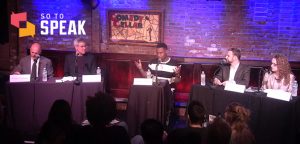Free speech—listed as a right in the First Amendment of the Constitution—is a foundational belief of our democracy:
Congress shall make no law respecting an establishment of religion, or prohibiting the free exercise thereof; or abridging the freedom of speech, or of the press; or the right of the people peaceably to assemble, and to petition the Government for a redress of grievances.
As the Supreme Court famously ruled in Tinker v. Des Moines, students don’t “shed their constitutional rights to freedom of speech and expression at the schoolhouse gate.”
However, many colleges and universities have developed speech codes for their students as well as guidelines for who can and cannot speak on their campuses or under what conditions. Usually, especially in public institutions, these codes and guidelines censor free speech.
The point of the First Amendment is that all are free to speak in most situations. We don’t have to agree with the speech; we can find it disgusting and offensive, but we can’t stifle it. As the Supreme Court pointed out in Cohen v. California, “one man’s vulgarity is another man’s lyric.”
And as Fire (Foundation for Individual Rights in Education), a group that devotes itself to protecting free speech in higher education, notes:
Freedom of speech is a fundamental American freedom and a human right, and there’s no place that this right should be more valued and protected than America’s colleges and universities. A university exists to educate students and advance the frontiers of human knowledge, and does so by acting as a “marketplace of ideas” where ideas compete. The intellectual vitality of a university depends on this competition—something that cannot happen properly when students or faculty members fear punishment for expressing views that might be unpopular with the public at large or disfavored by university administrators.
Following are two important resources about free speech on campus that I hope you’ll use:
FIRE has a comprehensive Guide to Free Speech on Campus.
They also produce a weekly podcast entitled So to Speak: The Free Speech Podcast. While it will take you 150 minutes to listen to all of “Debating ‘Is there a campus free speech crisis?’ with Sullivan, Haidt, Nossel, Sachs, & Foster,” it’s well worth your time!


